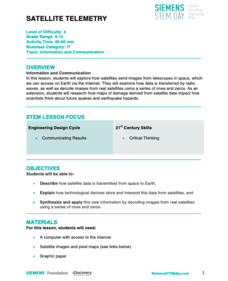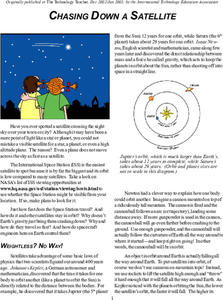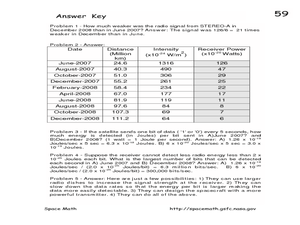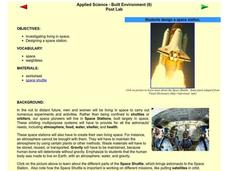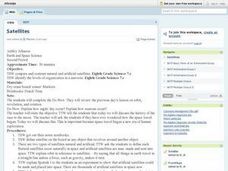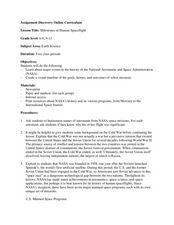Curated OER
Mission Complete, Houston
It was a bittersweet event when the space shuttle Atlantis touched down for the last time on July 21, 2011. Space science learners read an article about this event in The New York Times and then write answers to who, what, where, when,...
Curated OER
Cryosat Mission
Beginning with general information on satellites and seasons, concluding with polar ice and the Cryosat Mission, this worksheet gives your earth scientists an opportunity to conduct some research. Most of the assignment consists of short...
Discovery Education
Satellite Telemetry
Satellites require rockets to launch, but it doesn't take a rocket scientist to understand them. Future engineers learn about how satellites send data to Earth and how to interpret satellite images. They see how radio waves play a role...
American Museum of Natural History
Field Trip: Space Flight
Take a virtual trip to infinity and beyond. Pupils watch a space visualization that leaves Earth and heads to the ISS and then follows the Apollo missions to the moon. Scholars view detailed images of the space station and its different...
Curated OER
Space Shuttle
One slide details the features of Space Shuttle Discovery in graphic form. Another shows a faulty hydrogen fuel sensor. The final slide is a picture of the explosion of Space Shuttle Challenger and the ill-fated crew. If you wanted to...
NASA
Chasing Down a Satellite
Calculate the speed of the International Space Station. By reading the article, pupils learn about the concept of orbits. Scholars work through a formula to determine how fast the International Space Station is traveling to stay in...
NASA
Space-Based Astronomy on the Internet
Young scientists compile everything they have learned into a report in the fifth and final lesson in a unit on the visible light spectrum. Access to photos from observatories, telescopes, and satellites allows learners to compare...
Association of American Geographers
Project GeoSTART
Investigate the fascinating, yet terrifying phenomenon of hurricanes from the safety of your classroom using this earth science unit. Focusing on developing young scientists' spacial thinking skills, these lessons engage...
Curated OER
The STEREO Mission: Getting The Message Across
In this STEREO satellites worksheet, students are given a chart with the intensity of the signals from the satellites received on Earth and the distances of the satellite from Earth. Students convert the intensity at each distance to...
NASA
Space Shuttle Glider
Your charges will enjoy putting together this model of the space shuttle and completing the three challenge activities described in the lesson. The worksheets embedded in the plan that pupils use to cut out their gliders are beautifully...
University of Colorado
Spacecraft Speed
Space shuttles traveled around Earth at a speed of 17,500 miles per hour, way faster than trains, planes, or automobiles travel! In the 13th installment of 22, groups graph different speeds to show how quickly spacecraft move through...
Curated OER
Milestones in the Space Program
Students brainstorm names of astronauts from NASA space missions. They are explained that the Cold War was not actually a war but pervasive tension that existed between the United States and the Soviet Union for several decades...
Curated OER
Satellites and the Radiation Budget
Students engage in a prelab discussion about the earth's radiation budget and global warming. They use "trading cards" to find specific websites to research radiation budget questions.
Curated OER
Recreating A Mission
Middle schoolers role-play a satellite recovery mission. They explain and appreciate the complexity and planning involved in carrying out a shuttle mission.
Curated OER
A Problem in Satellite Synchrony
In this satellite synchrony worksheet, students use a spreadsheet or Least Common Multiples to solve 4 problems related to the satellite orbits, orbital periods and their synchronicity. Students determine when the satellites launched in...
Curated OER
Hinode Satellite Power
In this Hinode satellite worksheet, students find the area of the solar panels that cover the Hinode satellite to provide power. They determine the amount of power produced by the solar cells and if it is enough to keep all the...
Curated OER
Space Exploration Missions
Eighth graders explore and discuss the various space exploration missions. In this space mission lesson students work in pairs and create a PowerPoint presentation on the contributions of space exploration missions.
Curated OER
Design a Space Station
Sixth graders investigate living in space. For this science lesson, 6th graders discuss what it is like to live in space and create their own space station or space city of the future.
Curated OER
Team Moon
Learners read "Team Moon: How 400,000 People Landed Apollo 11 on the Moon," by Catherine Thimmesh. They watch portions of the movie "Apollo 13." Students use the internet and the attached study guide to discover specific information...
Curated OER
Satellites
Eighth graders explore the history of space travel and satellites. Through a teacher demonstration, 8th graders observe how a satellite revolves another object. They identify natural and artificial satellites, explore how satellites...
Curated OER
once and future MOON
Beyond the phases of the moon, this comprehensive lesson plan covers geologic history and geology. Amateur astronauts examine photos of the lunar landscape, experiment with the creation of craters, and delve into information about the...
Curated OER
Milestones in Human Spaceflight
Pupils investigate the history and goals of NASA and human spaceflight. In this space science lesson, students answer questions about one of seven manned space programs and print pictures from the mission. As a class,...
Curated OER
Solar System: Uranus
Students research Uranus and its geological formation, atmosphere, magnetic field, satellites, and rings.
NASA
NASA
Everything you have ever wanted to know about our solar system, space exploration, and more can be found here. Be prepared to clear your schedule; you will be sucked into the app like a star into a black hole.




